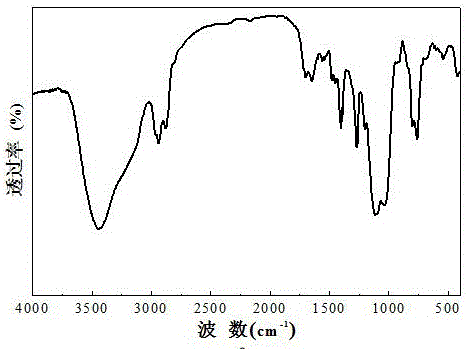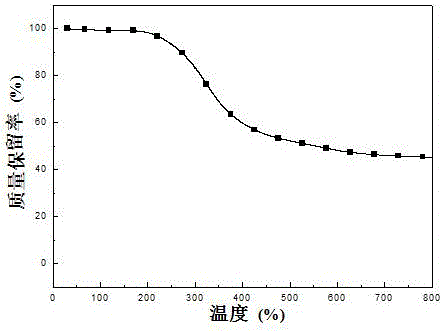Reaction type polysiloxane flame-retardant coating and preparation method thereof
A polysiloxane and flame retardant coating technology, applied in the field of reactive polysiloxane flame retardant coating and its preparation, can solve the problem of uneven composition, reduce the mechanical properties of the matrix, and does not mention the influence of the flame retardant coating. Coating and wood adhesion and other issues, to achieve the effect of excellent flame retardant performance, good flame retardant performance and strong adhesion
- Summary
- Abstract
- Description
- Claims
- Application Information
AI Technical Summary
Problems solved by technology
Method used
Image
Examples
Embodiment 1
[0078] Mix 5 parts of poly(methylhydrogensiloxane-dimethylsiloxane copolymer), 6*10 -5 Parts of Karstdet catalyst and 50 parts of isopropanol were added to a four-necked flask equipped with a reflux condenser, a thermometer, magnetic stirring, and an inert atmosphere, and the temperature was raised to 70°C and then stirred at a constant temperature for 15 minutes; after the temperature was raised to 100°C, the 15 parts of isocyanate propyltriethoxysilane and 15 parts of isopropanol in the pressure funnel were added dropwise into the four-necked flask, and the constant temperature reaction was continued for 6 hours; within 2 hours, 35 parts of allyl triethoxysilane in the constant pressure funnel Glycidyl ether and 20 parts of isopropanol were added dropwise in a four-necked flask, and the constant temperature reaction was continued for 6 hours; the solvent and unreacted substances were removed by distillation under reduced pressure to obtain the flame retardant intermediate API...
Embodiment 2
[0091] 10 parts of 1,3,5,7-tetramethylcyclotetrasiloxane, 4*10 -5 Parts of Speier catalyst and 60 parts of toluene solvent were added to a four-necked flask equipped with a reflux condenser, a thermometer, magnetic stirring, and an inert atmosphere, and the temperature was raised to 70°C and then stirred at a constant temperature for 10 minutes; after the temperature was raised to 95°C, the 10 parts of isocyanate propyltriethoxysilane and 15 parts of toluene in the funnel were added dropwise into the four-necked flask, and the reaction was continued at constant temperature for 8 hours; within 2 hours, 30 parts of allyl glycidyl ether in the constant pressure funnel Add 35 parts of toluene dropwise into a four-necked flask, and continue the constant temperature reaction for 7 hours; remove the solvent and unreacted substances by distillation under reduced pressure to obtain the flame retardant intermediate API; all the flame retardant intermediates obtained in the previous step ...
Embodiment 3
[0095] Mix 6 parts of polymethylhydrogen siloxane, 7*10 -5 Parts of Speier catalyst and 70 parts of toluene solvent were added to a four-necked flask equipped with a reflux condenser, a thermometer, magnetic stirring, and an inert atmosphere, and the temperature was raised to 70°C and then stirred at a constant temperature for 10 minutes; after the temperature was raised to 100°C, the 10 parts of 3-isocyanatopropyl trimethoxysilane and 15 parts of toluene in the funnel were added dropwise into the four-necked flask, and the constant temperature reaction was continued for 7 hours; 50 parts of allyl glycidyl ether in the constant pressure funnel were added within 3 hours Add 20 parts of toluene dropwise into a four-neck flask, continue the constant temperature reaction for 5 hours; remove the solvent and unreacted substances by distillation under reduced pressure to obtain the flame retardant intermediate API; all the flame retardant intermediate API obtained in the previous step...
PUM
| Property | Measurement | Unit |
|---|---|---|
| thickness | aaaaa | aaaaa |
| thickness | aaaaa | aaaaa |
| oxygen index | aaaaa | aaaaa |
Abstract
Description
Claims
Application Information
 Login to View More
Login to View More - R&D
- Intellectual Property
- Life Sciences
- Materials
- Tech Scout
- Unparalleled Data Quality
- Higher Quality Content
- 60% Fewer Hallucinations
Browse by: Latest US Patents, China's latest patents, Technical Efficacy Thesaurus, Application Domain, Technology Topic, Popular Technical Reports.
© 2025 PatSnap. All rights reserved.Legal|Privacy policy|Modern Slavery Act Transparency Statement|Sitemap|About US| Contact US: help@patsnap.com



